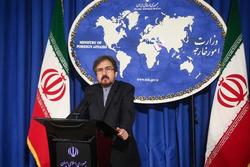 Iranian Foreign Ministry Spokesman Bahram Qassemi denounced Bahrain’s monarchy for stifling any peaceful voice of protest in the tiny Persian Gulf island, specially the recent case of giving a life sentence to prominent opposition figure Sheikh Ali Salman.
Iranian Foreign Ministry Spokesman Bahram Qassemi denounced Bahrain’s monarchy for stifling any peaceful voice of protest in the tiny Persian Gulf island, specially the recent case of giving a life sentence to prominent opposition figure Sheikh Ali Salman. RNA - “Issuing a cruel verdict based on unsubstantial accusations against him (Sheikh Salman) shows that the Bahraini government, by relying on the support of some foreign countries, is pursuing a plan to eliminate any peaceful voice of protest in the country,” Qassemi said.
Qassemi further criticized the international community’s silence on Bahrain's inhumane measures.
He slammed the “hypocritical” position of the US on Manama’s policies and said Washington has given the green light to the Bahraini government to suppress the dissidents by selling arms to the regime and providing it with “full political support.”
Instead of fully relying on foreign support for meeting the country’s security needs, Bahraini officials had better solve the “self-made crisis” in the country by holding real and serious talks with opposition groups and fulfilling the Bahraini people’s legitimate demands, Qassemi said.
Earlier on Monday, Qassemi had deplored the life sentence verdicts handed down by Bahrain's highest court to three opposition leaders, including top cleric Sheikh Ali Salman, calling on Manama to recognize the civil rights of the country's people.
"This measure is condemned; we do not interfere in Bahrain's internal issues but have always recommended the Bahraini government to recognize the civil rights of all Bahraini people to guarantee its security and interests, avoid contradictory measures and double and illegal standards," he said.
He expressed the hope that Bahrain could cope with the realities in the country and would avoid provocative measures which can lead to instability and insecurity in the entire region.
Bahrain's highest court upheld life sentences against three opposition leaders, including Sheikh Salman, on charges of spying for Qatar, a judicial source said Monday.
Al-Wefaq secretary-general Salman and two senior al-Wefaq leaders Sheikh Hassan Sultan and Ali al-Aswad were sentenced to life imprisonment in November.
The verdicts issued Monday are final and cannot be appealed.
The 53-year-old Salman was convicted in November of "communicating with Qatari officials... to overthrow constitutional order", a ruling rights groups have denounced as a travesty of justice.
The London-based human rights group Bahrain Institute for Rights and Democracy (BIRD) announced that the verdict marked the end of a "long, flawed trial".
Back then, Wefaq stated that the Bahraini judiciary was a tool in the hands of the ruling Manama regime, and the ruling reflected the magnitude of turmoil in the kingdom.
Sultan and al-Aswad, who had been sentenced to life in absentia, also lost their right to appeal.
Qatar, currently embroiled in a rift with Saudi Arabia and its Persian Gulf allies, has categorically denied accusations of conspiring with Salman against Bahrain.
In June 2017, Saudi Arabia, Egypt, Bahrain, and the United Arab Emirates severed their diplomatic ties with Qatar, accusing Doha of supporting terrorism. The four countries also imposed a land, sea, and air blockade on Qatar.
Human rights groups have frequently stressed that cases against activists in Bahrain fail to meet the fundamental requirements of fair trials.
Thousands of anti-regime protesters have regularly held demonstrations in Bahrain ever since a popular uprising began in the kingdom in mid-February 2011. They are demanding that the Al Khalifah dynasty relinquish power and allow a just system representing all Bahrainis to be established.
Manama has gone to great lengths to clamp down on any sign of dissent. In March 2011, troops from Saudi Arabia and the United Arab Emirates were deployed to assist Bahrain in its crackdown.
Scores of people have lost their lives and hundreds of others sustained injuries or got arrested as a result of the Al Khalifah regime’s iron-fisted security response.
847/940